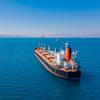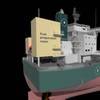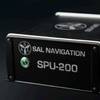World Maritime Day 2014 Celebrated in Mumbai
25th September, the Day when the World Maritime Day gets celebrated in Mumbai is an event well-known among the seafaring community and in the shipping and other related circles. Though other centers in India too have their own celebration but many make it a point to attend the one that is held at the Auditorium of the Shipping Corporation of India (SCI) ( SCI is the national carrier) at Nariman Point, Mumbai. This year too saw a massive gathering as the day is used to focus attention on the importance of shipping safety, maritime security and the marine environment and to emphasize a particular aspect of IMO's work.
As directed by the International Maritime Organization the theme of World Maritime Day (WMD) 2014 was "IMO Conventions: Effective Implementation." It was chosen to highlight those IMO treaties that have not yet entered into force, as well as those for which ratification by more states and more effective implementation would yield significant benefits.
The list of agreements includes the International Convention for the Control and Management of Ships' Ballast Water and Sediments (2004), the Nairobi International Convention on the Removal of Wrecks (2007), the Hong Kong International Convention for the Safe and Environmentally Sound Recycling of Ships (2009) and the 2010 Protocol to the International Convention on Liability and Compensation for Damage in Connection with the Carriage of Hazardous and Noxious Substances by Sea. This year’s celebration included a seminar with three speakers making presentations on these conventions.
Gautam Chatterjee, the Director General of Shipping & Ex. Officio Additional Secretary to the Govt. of India in his welcome speech pointed out that the state have ratified them and it was for the industry to take these convention forward. If any convention is not widely accepted then there is the need to find out actually why they have not achieved the objective. Also if there has been transparency during the process of framing the regulations and whether they are fair and not likely to harm the various players in the field but help to add value to their service. “We need to see that the IMO Conventions should initiate growth and progress besides synergizing the operations,” he said. “In fact there are meant to serve for the betterment of the member states.”
Giving the Regulators view point on Nairobi International Convention on the Removal of Wrecks, Capt K. P. Jaikumar, Deputy General of Shipping informed that only 10 member states were required to ratify this convention and India was second to do so. He described the areas where the regulation was applicable. He cautioned that the key obligation was that it was applicable to all ship above 300 GT and the concerned ship owner should ensure the ship is insured and that there is financial security. “But there are some challenges,” he said. “The convention makes operational cost higher not only for coastal vessels but for others vessels too.”
Giving the ship owners perspective Capt Ranjit Singh representing Indian National Shipowners’ Association (INSA) said that various aspects of these conventions prior to implementation need to be looked into and if the resultant consequences are not identified then it becomes difficult to take proper and timely action. That is when ship owners start to face hurdles.
Referring to various convention he asked, ‘Is the ship owner a milking cow? Ballast Water Management, Wreck Removal and other convention have placed a heavy burden on the ship owners. It is unfortunate that IMO had not carried out any study prior to the conventions being passed to find out the cost and the burden to the various players in the field. He desired that the conventions should exempt existing ship owners from compliance. There should be provision for additional support and assistance in capacity building to developing nations.” He wondered whether these conventions made to benefit certain countries.
Representing the classification society, Capt H.V. Ramesh a surveyor with the Indian Register of Shipping (IRS) spoke about the role of the RO (recognized organization). He explained the use of compliance through alternative methods which IMO has allowed. He agreed with the ship owners’ point of view that the BWM is placing heavy burden on them. For this he advocated the use of Ballast Water Treatment BOAT which has been designed by IRS. This he said did not require any machinery to be installed on the vessel instead the BWTBOAT comes alongside the ship while in port or elsewhere and removes the ballast water for treatment and disposal.
Extending hearty thanks to all, the Chairman of the Organizing committee of the WMD, A K Gupta, Chairman and Managing Director of SCI at the outset congratulated the Indian scientists of the Indian Space Research Organization (ISRO) for having successfully placed an orbiter craft around the Mars in their very first attempt which no other country has done so far. In this regard he informed that two of the vessels of the Shipping Corporation viz SCI Nalanda and SCI Yamuna also played a part in tracking the space craft during the mission with equipment installed by ISRO on these vessels.










